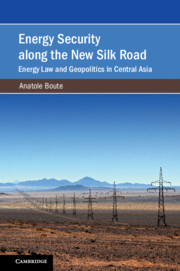Book contents
- Energy Security along the New Silk Road
- Cambridge Studies on Environment, Energy and Natural Resources Governance
- Energy Security along the New Silk Road
- Copyright page
- Dedication
- Contents
- Figures
- Map
- Preface and Acknowledgements
- Abbreviations
- 1 Introduction
- 2 Central Asian Energy Security
- 3 Regional Energy Market Reform
- 4 Corporate Restructuring Reform
- 5 Reform of the Energy Market Architecture
- 6 Tariff Reforms
- 7 Market Reform, Consumer Protection and Energy Efficiency
- 8 Non-payment and Theft
- 9 Conclusion
- Select Bibliography
- Index
6 - Tariff Reforms
Published online by Cambridge University Press: 04 June 2019
- Energy Security along the New Silk Road
- Cambridge Studies on Environment, Energy and Natural Resources Governance
- Energy Security along the New Silk Road
- Copyright page
- Dedication
- Contents
- Figures
- Map
- Preface and Acknowledgements
- Abbreviations
- 1 Introduction
- 2 Central Asian Energy Security
- 3 Regional Energy Market Reform
- 4 Corporate Restructuring Reform
- 5 Reform of the Energy Market Architecture
- 6 Tariff Reforms
- 7 Market Reform, Consumer Protection and Energy Efficiency
- 8 Non-payment and Theft
- 9 Conclusion
- Select Bibliography
- Index
Summary
Builds on the theory of energy tariff regulation to explain the delicate balancing of investors’ and consumers’ concerns in Central Asia’s energy laws and regulations, as well as in judicial and regulatory practice in Central Asia. The social compact governing energy pricing, the negative perception of profit and popular frustration with the mismanagement of utilities makes finding the right balance between utilities and consumers’ interests one of the most significant challenges for tariff reform in general, and for reform in Central Asia in particular. Given the institutional obstacles to tariff reform, efforts to improve tariff legislation are of limited effectiveness in the absence of guarantees of enforcement of the utilities’ rights. Surprisingly, judicial practice in Central Asia (in particular in Kazakhstan) demonstrates that, in countries where the judiciary is friendly towards the government, the courts still have a key role to play in enforcing the tariff laws. This role is quite different to that usually advocated in the rule of law and market reform literature. The case of Kazakhstan illustrates how the courts can contribute to the legitimation of tariff reform by shifting the blame for tariff increases from the government onto the judiciary, thereby helping win public acquiescence in much-needed tariff reform.
Keywords
- Type
- Chapter
- Information
- Energy Security along the New Silk RoadEnergy Law and Geopolitics in Central Asia, pp. 172 - 204Publisher: Cambridge University PressPrint publication year: 2019

